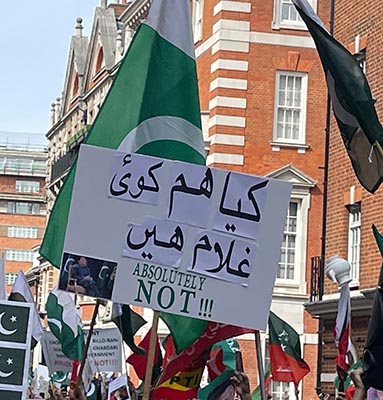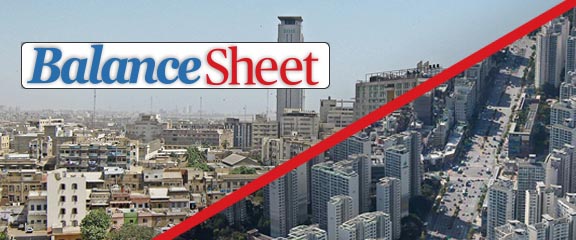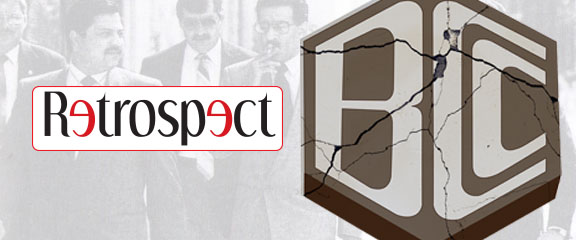Karachi is dazed by Imran Khan’s jalsa. It was not just big, it was massive, passionate, and spontaneous. Those who thought that Imran Khan is finished, will have to think again. His young supporters adore him as the hope for Pakistan. His audience is better educated, more middle class, with lots of fashionable young ladies. They believe his storyline of a US conspiracy, ‘the Letter,’ and his attack on corruption, labelling his opponents thieves. He is now a powerful orator and his team has developed a capability in both social media and organising public meetings that has surpassed Bhutto. He has polished his image of being an anti-American, anti-West, patriotic and Islamist figure. His strategy for his return is to explain his ouster as an attack by corrupt parliamentarians, who have been purchased by America. His one demand is for early elections before the impact of the Letter fades and before the inevitable attack on both him and his associates becomes dangerous.
The PDM, successful in removing Imran from the government after a dramatic no-confidence battle in which both the Supreme Court and the establishment played a crucial part, hardly had time to celebrate before a new battle started on the street.
Imran Khan was down but not out.
He was determined to fight on using the same tactics — the conspiracy, ‘the Letter,’ the corruption of the “thieves.” He was unperturbed by both the Supreme Court and the army stating firmly that there was no conspiracy, no damning letter. He disregarded Transparency International’s Corruption Perception Index which clearly stated that the corruption under Imran exceeded the corruption of the Nawaz government that had preceded him. His propaganda went haywire under his spin doctors, Fawad Chaudhry and Sheikh Rashid, whose wild stories matched those of Hitler’s Goebbels. False videos became the norm and General Mirza Aslam Baig had to come out with a denial that he had been impersonated and was shamed and angered by the statements that were made in his name in a false video.
Shehbaz Sharif was sworn in and turned his attention on how to salvage the collapsed economy. His track record in the Punjab as Chief Minister had won him credibility, both in Pakistan and internationally. If anyone could tackle the economy, it was Shehbaz, but suddenly the economy was no longer centre stage, agitation and confrontation had removed inflation from the headlines. On this battlefield, a leader needed charisma and cult following, in which Imran excelled, Shehbaz’s capability was of little use here. Shehbaz lived in a world of cold reality in which he struggled tirelessly as a workhorse to overcome problems and to deliver results. Imran lived in a world of fantasy and dreams where he soared like an eagle. Shehbaz, now prime minister, had power and wanted to solve Pakistan’s problems. Imran wanted power at any cost and knew only too well that his conspiracy theories and ‘the Letter,’ alienating America and the West, and his lowering fuel and electricity prices in defiance of commitments made to the IMF would not help Pakistan but could win him back government. But for this to work, Imran needed a fast election. It was now or never.
Imran’s posters shouted “Absolutely Not.” This posturing drove his fans wild despite the fact that the US had never requested bases, the army high command had firmly denied that any such request had ever been made, and it just was not true. Imran claimed that Pakistan’s nuclear assets were at risk due to treacherous leaders under foreign influence. Army Chief General Qamar Javed Bajwa contradicted this, saying the nuclear assets were perfectly safe, irrespective of whichever party controlled the government. Gen. Bajwa declared that the army was neutral regarding the political struggle, Imran replied that only animals are neutral. The DG ISPR announced that Gen. Bajwa would retire in November as planned. If the elections took place after November, Shehbaz would decide on who would be the new chief, giving one more reason for Imran to fight for an early election.

For three years, Imran had smeared the reputation of his political opponents, calling them thieves and sell-outs and persecuting them mercilessly through NAB. Now it was his turn to answer accusations of profiteering by selling 58 state gifts worth Rupees 140 million, watches, jewellery, a vehicle, and a gold-plated Kalashnikov. His sister-in-law Fara, his wife Bushra, and former chief minister Punjab, Buzdar, were linked to scandals. But the PDM needed time to convince the public that Imran was not the saint they thought him to be. The foreign funding case which had seen over 70 adjournments now started to move forward. This was a sword of Damocles hanging over Imran’s head that could disqualify him from participating in elections. Imran was vulnerable, but the wheels of justice take time, and time needs a delayed election.
In the corridors of power, Imran is seen, for now, as history, but in the streets and the hearts of his followers he is embraced as the future. Imran often sees his politics in Chinese terms. He compares his struggle with Mao, he calls his processions Long Marches after Mao’s Long March. He sees his current movement as Pakistan’s Cultural Revolution, the revolution in China that destroyed the established leaders when the tsunami of public passion smashed the elite. Many years after the Cultural Revolution there was another mass movement in China against the establishment, which reached its crescendo in Tiananmen Square.
In Tiananmen Square the strength of the street met the strength of the state. Hundreds of thousands of protesters took over the square, attacking corruption, nepotism, and inflation. Protesters held the state to ransom in 400 cities and towns but they had underestimated Deng’s resolve. Mao had once told a visiting dignitary, “don’t underestimate that little man, single handed he defeated Chiang Kai Shek’s million man army.” When Deng called out the troops, they were not willing to fire on the protesters. He changed the commanders and the Tiananmen incident took place, restoring stability and thereby allowing Deng to promote his socialism with capitalist characteristics. Is Imran’s movement a Cultural Revolution or will it lead to Pakistan’s Tiananmen Square? It is ominous that Imran compares his movement to the Chinese Cultural Revolution, perhaps forgetting the unfortunate impact it had on the Chinese economy, whereas the much maligned Tiananmen incident laid the foundation of an economic surge such as never been seen before anywhere in the world, ending poverty in China and creating an economy that seems set to become the largest in the world.
In the battle that has just begun, Imran has his full team, disciplined and ready for the battle, Shehbaz is struggling alone. He is a great administrator and negotiator for the economy, but he lacks the charisma of his niece, Maryam Nawaz, to take on a mass struggle against Imran. He also needs the return of his brother Nawaz, who has the political will and skill to take on the battle with Imran who is determined to take down the PDM government, whatever it takes. If it costs Pakistan its relationship with America and Europe, he is ready to pay the price, even if Pakistan’s funding dries up and export markets contract. Imran and his passionate followers have declared that national honour is more important than the economy. Imran has not come to save us from petty issues such as the rising prices of potatoes and tomatoes, he has come to ‘free us from slavery,’ to save us from American military bases, and to lead us back to the true Islam. He will not be restrained by constitutional law or economic theory. He does not believe that beggars can’t be choosers, but in our international relations taking the path of “honour rather than expediency.” In his three years as prime minister, he has alienated America whose President Biden refused him a phone call, alienated Europe by his arriving in Moscow the day the Ukraine War broke out, and irritated China by defaulting on payment of Rs. 250 billion to the Chinese power plants.
In the next election, whether it takes place sooner or later, Pakistan will have to choose between honour as represented by Imran or the “price of potatoes,” the reality of daily life that will be the overriding concern of Shehbaz.



